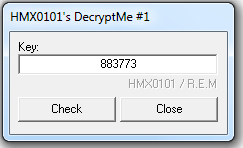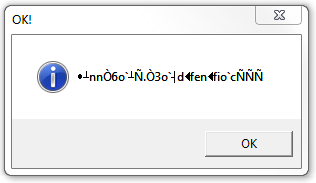Crackmes.de – HMX0101's DecryptMe
This crackme has been published April 20th 2006 with rating “Difficulty: 1 – Very easy, for newbies”. Despite the low level of difficulty, there are no accepted solutions yet. The correct solution has been posted in the comments by AssemblyJammer69:
“Easy one, here is a working key:126, the rest of the keys are increments of 128 using 126 as the starting number.”
This solution is about how to get to this result. The crackme requires you to break an encryption routine, which is obfuscated with meaningless code.
Introduction
The user interface of the crackme has an input box to enter the key:

Only digits can be entered, i.e., only non-negative integers. After clicking Check, you are always presented with a message box titled OK!:

The text of the message box depends on the entered key, and is the ciphertext decrypted with the entered key dk(c).
The crackme does not reveal the correct plaintext and does not give feedback whether we entered the correct key or not. We therefore need to find the correct key without a known plaintext. However, we can work with the assumption that the message box text is in English and follows the corresponding letter frequency. But first, we need to reverse engineer the decryption routine.
Code Overview
We know that the result of the decryption is probably shown in the OK! message box. The plaintext is therefore the lpText variable of a MessageBox call, see MessageBox on MSDN. After loading the crackme in IDA Pro we find two references to MessageBox. The first one is related to a Runtime error and not the OK! box:
CODE:00012E92 push 0 ; uType CODE:00012E94 push offset Caption ; "Error" CODE:00012E99 push offset Text ; "Runtime error at 00000000" CODE:00012E9E push 0 ; hWnd CODE:00012EA0 call MessageBoxA
The second place is more promising, these are the lines that lead up to the second message box:
CODE:0001400B push eax ; lpCaption OK! CODE:0001400C lea edx, [ebp+var_10] CODE:0001400F mov eax, ds:off_150D0 CODE:00014014 call sub_13770 CODE:00014019 mov eax, [ebp+var_10] CODE:0001401C push eax CODE:0001401D mov eax, [ebp+var_4] CODE:00014020 call sub_13C94 CODE:00014025 mov edx, eax CODE:00014027 lea ecx, [ebp+var_C] CODE:0001402A pop eax CODE:0001402B call sub_13E1C CODE:00014030 mov eax, [ebp+var_C] CODE:00014033 call sub_1314C CODE:00014038 push eax ; lpText CODE:00014039 push 0 ; hWnd CODE:0001403B call MessageBoxA_0
At offset 1400B the caption “OK!” is pushed on the stack. In line 00014038 the text of the message box is pushed, i.e., eax holds the ciphertext at this point.
Using a debugger, we see that [ebp+var_4] holds the serial. Offset 1401D loads the serial in eax, followed by a call to sub_13C94. The routine sub_13C94 is::
CODE:00013C94 ; =============== S U B R O U T I N E ======================================= CODE:00013C94 CODE:00013C94 CODE:00013C94 sub_13C94 proc near ; CODE XREF: sub_13FD0+50p CODE:00013C94 CODE:00013C94 var_24 = dword ptr -24h CODE:00013C94 var_20 = dword ptr -20h CODE:00013C94 var_1C = dword ptr -1Ch CODE:00013C94 var_18 = dword ptr -18h CODE:00013C94 sign = dword ptr -14h CODE:00013C94 CODE:00013C94 push ebx CODE:00013C95 push esi CODE:00013C96 push edi CODE:00013C97 push ebp CODE:00013C98 add esp, 0FFFFFFF4h CODE:00013C9B mov esi, eax CODE:00013C9D mov [esp+1Ch+var_1C], 0 CODE:00013CA4 mov [esp+1Ch+var_18], 0 CODE:00013CAC test esi, esi CODE:00013CAE jz loc_13D3A CODE:00013CB4 mov [esp+1Ch+sign], 1 CODE:00013CBC mov edi, 1 CODE:00013CC1 cmp byte ptr [esi], '-' CODE:00013CC4 jnz short loc_13CCF CODE:00013CC6 mov [esp+1Ch+sign], -1 CODE:00013CCE inc edi CODE:00013CCF CODE:00013CCF loc_13CCF: ; CODE XREF: sub_13C94+30j CODE:00013CCF mov eax, esi CODE:00013CD1 call strlen CODE:00013CD6 mov ebp, eax CODE:00013CD8 sub ebp, edi CODE:00013CDA jl short loc_13D1E CODE:00013CDC inc ebp CODE:00013CDD CODE:00013CDD loc_13CDD: ; CODE XREF: sub_13C94+88j CODE:00013CDD mov bl, [esi+edi-1] CODE:00013CE1 cmp bl, '0' CODE:00013CE4 jb short loc_13D1E CODE:00013CE6 cmp bl, '9' CODE:00013CE9 ja short loc_13D1E CODE:00013CEB push 0 CODE:00013CED push 0Ah CODE:00013CEF mov eax, [esp+24h+var_1C] CODE:00013CF3 mov edx, [esp+24h+var_18] CODE:00013CF7 call sub_131C4 CODE:00013CFC push edx CODE:00013CFD push eax CODE:00013CFE xor eax, eax CODE:00013D00 mov al, bl CODE:00013D02 cdq CODE:00013D03 add eax, [esp+24h+var_24] CODE:00013D06 adc edx, [esp+24h+var_20] CODE:00013D0A add esp, 8 CODE:00013D0D sub eax, 30h CODE:00013D10 sbb edx, 0 CODE:00013D13 mov [esp+1Ch+var_1C], eax CODE:00013D16 mov [esp+1Ch+var_18], edx CODE:00013D1A inc edi CODE:00013D1B dec ebp CODE:00013D1C jnz short loc_13CDD CODE:00013D1E CODE:00013D1E loc_13D1E: ; CODE XREF: sub_13C94+46j CODE:00013D1E ; sub_13C94+50j ... CODE:00013D1E cmp [esp+1Ch+sign], 0 CODE:00013D23 jge short loc_13D3A CODE:00013D25 mov eax, [esp+1Ch+var_1C] CODE:00013D28 mov edx, [esp+1Ch+var_18] CODE:00013D2C neg eax CODE:00013D2E adc edx, 0 CODE:00013D31 neg edx CODE:00013D33 mov [esp+1Ch+var_1C], eax CODE:00013D36 mov [esp+1Ch+var_18], edx CODE:00013D3A CODE:00013D3A loc_13D3A: ; CODE XREF: sub_13C94+1Aj CODE:00013D3A ; sub_13C94+8Fj CODE:00013D3A mov eax, [esp+1Ch+var_1C] CODE:00013D3D mov edx, [esp+1Ch+var_18] CODE:00013D41 add esp, 0Ch CODE:00013D44 pop ebp CODE:00013D45 pop edi CODE:00013D46 pop esi CODE:00013D47 pop ebx CODE:00013D48 retn CODE:00013D48 sub_13C94 endp
We immediately recognize the ASCII code for “0”, “9” and “-”: the routine converts strings to (signed) integers, like the C library function atoi. The subroutine return the integer in eax. The serial as integer is then passed in edx to sub_13E1C:
CODE:00014020 call sub_13C94 CODE:00014025 mov edx, eax CODE:00014027 lea ecx, [ebp+var_C] CODE:0001402A pop eax CODE:0001402B call sub_13E1C
Before analysing sub_13E1C let`s first check the subroutine sub_1314C which is called last before the message box is shown:
CODE:00014033 call sub_1314C
The subroutine is very short:
CODE:0001314C sub_1314C proc near ; CODE XREF: sub_13FD0+36p CODE:0001314C ; sub_13FD0+63p ... CODE:0001314C test eax, eax CODE:0001314E jz short loc_13152 CODE:00013150 retn CODE:00013150 ; --------------------------------------------------------------------------- CODE:00013151 byte_13151 db 0 ; DATA XREF: sub_1314C:loc_13152o CODE:00013152 ; --------------------------------------------------------------------------- CODE:00013152 CODE:00013152 loc_13152: ; CODE XREF: sub_1314C+2j CODE:00013152 mov eax, offset byte_13151 CODE:00013157 retn CODE:00013157 sub_1314C endp
All it does is substitute eax with byte_13141 = 0 if and only if eax is 0. Apart from potentially changing the flags, the routine does nothing. Our penultimate routine sub_13E1C therefore has to do all the decryption. Renaming the subroutines accordingly we have:
CODE:0001400B push eax ; lpCaption OK! CODE:0001400C lea edx, [ebp+var_10] CODE:0001400F mov eax, ds:off_150D0 CODE:00014014 call sub_13770 CODE:00014019 mov eax, [ebp+var_10] CODE:0001401C push eax CODE:0001401D mov eax, [ebp+serial] CODE:00014020 call atoi CODE:00014025 mov edx, eax CODE:00014027 lea ecx, [ebp+var_C] CODE:0001402A pop eax CODE:0001402B call decrypting CODE:00014030 mov eax, [ebp+var_C] CODE:00014033 call nop CODE:00014038 push eax ; lpText CODE:00014039 push 0 ; hWnd CODE:0001403B call MessageBoxA_0
The Decryption Routine
The decryption subroutine is very long:
CODE:00013E1C ; =============== S U B R O U T I N E ======================================= CODE:00013E1C CODE:00013E1C ; Attributes: bp-based frame CODE:00013E1C CODE:00013E1C decrypting proc near ; CODE XREF: sub_13FD0+5Bp CODE:00013E1C CODE:00013E1C set_to_zero= dword ptr -24h CODE:00013E1C strlen_ciphertext= dword ptr -20h CODE:00013E1C j_plus_1= dword ptr -1Ch CODE:00013E1C plaintext= dword ptr -18h CODE:00013E1C i_plus_one= dword ptr -14h CODE:00013E1C var_10= dword ptr -10h CODE:00013E1C serial_as_int= dword ptr -0Ch CODE:00013E1C ciphertext= dword ptr -8 CODE:00013E1C var1= dword ptr -4 CODE:00013E1C CODE:00013E1C push ebp CODE:00013E1D mov ebp, esp CODE:00013E1F add esp, 0FFFFFFDCh CODE:00013E22 push ebx CODE:00013E23 xor ebx, ebx CODE:00013E25 mov [ebp+set_to_zero], ebx CODE:00013E28 mov [ebp+var_10], ecx CODE:00013E2B mov [ebp+serial_as_int], edx CODE:00013E2E mov [ebp+ciphertext], eax CODE:00013E31 mov eax, [ebp+ciphertext] CODE:00013E34 call increment_special_byte CODE:00013E39 xor eax, eax CODE:00013E3B push ebp CODE:00013E3C push offset loc_13F6F CODE:00013E41 push dword ptr fs:[eax] CODE:00013E44 mov fs:[eax], esp CODE:00013E47 mov eax, [ebp+var_10] CODE:00013E4A call sub_12FA4 CODE:00013E4F mov eax, [ebp+ciphertext] CODE:00013E52 call strlen CODE:00013E57 test eax, eax CODE:00013E59 jle loc_13F51 CODE:00013E5F mov [ebp+strlen_ciphertext], eax CODE:00013E62 mov [ebp+i_plus_one], 1 CODE:00013E69 CODE:00013E69 loc_13E69: ; CODE XREF: decrypting+12Fj CODE:00013E69 mov eax, [ebp+ciphertext] CODE:00013E6C call strlen CODE:00013E71 mov [ebp+var1], eax CODE:00013E74 mov eax, [ebp+ciphertext] CODE:00013E77 mov edx, [ebp+i_plus_one] CODE:00013E7A movzx eax, byte ptr [eax+edx-1] ; get ciphertext[i] CODE:00013E7F sub eax, 2644h ; subtract a CODE:00013E84 mov [ebp+plaintext], eax CODE:00013E87 mov eax, [ebp+plaintext] CODE:00013E8A add eax, eax ; multiply by 2 CODE:00013E8C add [ebp+var1], eax CODE:00013E8F xor [ebp+plaintext], 0DEADh CODE:00013E96 mov eax, [ebp+var1] CODE:00013E99 sar eax, 1 ; divide by 2 CODE:00013E9B jns short loc_13EA0 CODE:00013E9D adc eax, 0 CODE:00013EA0 CODE:00013EA0 loc_13EA0: ; CODE XREF: decrypting+7Fj CODE:00013EA0 mov [ebp+var1], eax CODE:00013EA3 mov eax, [ebp+serial_as_int] CODE:00013EA6 add eax, 10 CODE:00013EA9 add [ebp+plaintext], eax CODE:00013EAC add [ebp+var1], 1337h CODE:00013EB3 mov eax, [ebp+serial_as_int] CODE:00013EB6 add eax, eax CODE:00013EB8 mov edx, [ebp+plaintext] CODE:00013EBB sub edx, eax CODE:00013EBD xor edx, [ebp+serial_as_int] CODE:00013EC0 mov [ebp+plaintext], edx CODE:00013EC3 mov eax, [ebp+plaintext] CODE:00013EC6 imul [ebp+serial_as_int] CODE:00013EC9 sub [ebp+var1], eax CODE:00013ECC mov [ebp+j_plus_1], 1 CODE:00013ED3 CODE:00013ED3 loc_13ED3: ; CODE XREF: decrypting+E4j CODE:00013ED3 mov eax, [ebp+j_plus_1] CODE:00013ED6 movzx eax, ds:byte_1509F[eax] CODE:00013EDD add eax, eax CODE:00013EDF xor [ebp+var1], eax CODE:00013EE2 mov eax, [ebp+j_plus_1] CODE:00013EE5 movzx eax, ds:byte_1509F[eax] CODE:00013EEC xor [ebp+plaintext], eax CODE:00013EEF mov eax, [ebp+var1] CODE:00013EF2 cdq CODE:00013EF3 idiv [ebp+j_plus_1] CODE:00013EF6 mov [ebp+var1], eax CODE:00013EF9 inc [ebp+j_plus_1] CODE:00013EFC cmp [ebp+j_plus_1], 37 CODE:00013F00 jnz short loc_13ED3 CODE:00013F02 add [ebp+var1], 0ABh CODE:00013F09 sub [ebp+plaintext], 100h CODE:00013F10 mov eax, [ebp+plaintext] CODE:00013F13 add eax, 0DEADh CODE:00013F18 imul [ebp+var1] CODE:00013F1B mov [ebp+var1], eax CODE:00013F1E mov eax, [ebp+var1] CODE:00013F21 xor eax, eax CODE:00013F23 mov [ebp+var1], eax CODE:00013F26 mov eax, [ebp+var1] CODE:00013F29 add [ebp+plaintext], eax CODE:00013F2C lea eax, [ebp+set_to_zero] CODE:00013F2F mov edx, [ebp+plaintext] ; EDX & 0xFF IS PLAINTEXT CHAR CODE:00013F32 call sub_13098 CODE:00013F37 mov edx, [ebp+set_to_zero] CODE:00013F3A mov eax, [ebp+var_10] CODE:00013F3D call copy_from_edx_to_plaintext CODE:00013F42 mov eax, [ebp+var_10] CODE:00013F45 inc [ebp+i_plus_one] CODE:00013F48 dec [ebp+strlen_ciphertext] CODE:00013F4B jnz loc_13E69 CODE:00013F51 CODE:00013F51 loc_13F51: ; CODE XREF: decrypting+3Dj CODE:00013F51 xor eax, eax CODE:00013F53 pop edx CODE:00013F54 pop ecx CODE:00013F55 pop ecx CODE:00013F56 mov fs:[eax], edx CODE:00013F59 push offset loc_13F76 CODE:00013F5E CODE:00013F5E loc_13F5E: ; CODE XREF: decrypting+158j CODE:00013F5E lea eax, [ebp+set_to_zero] CODE:00013F61 call sub_12FA4 CODE:00013F66 lea eax, [ebp+ciphertext] CODE:00013F69 call sub_12FA4 CODE:00013F6E retn CODE:00013F6F ; --------------------------------------------------------------------------- CODE:00013F6F CODE:00013F6F loc_13F6F: ; DATA XREF: decrypting+20o CODE:00013F6F jmp loc_12A40 CODE:00013F74 ; --------------------------------------------------------------------------- CODE:00013F74 jmp short loc_13F5E CODE:00013F76 ; --------------------------------------------------------------------------- CODE:00013F76 CODE:00013F76 loc_13F76: ; CODE XREF: decrypting+152j CODE:00013F76 ; DATA XREF: decrypting+13Do CODE:00013F76 pop ebx CODE:00013F77 mov esp, ebp CODE:00013F79 pop ebp CODE:00013F7A retn CODE:00013F7A decrypting endp
With help of debugging we find out that after offset 13F2F, the least significant byte of edx contains the plaintext characters. The whole routine has many instructions that don`t affect the plaintext. Removing all unnecessary operations leads to this decryption routine:
FUNCTION decrypt(ciphertext, key)
plaintext = ""
FORALL characters c IN ciphertext DO
plaintext_char = c - 0x2644
plaintext_char ^= 0x0DEAD
plaintext_char += 10
plaintext_char -= key
plaintext_char ^= key
plaintext += (plaintext_char & 0xFF)
END FOR
END FUNCTION
The ciphertext is passed to the decryption routine as eax, which is set to var_10 here:
CODE:00014019 mov eax, [ebp+var_10]
The ciphertext consists of the following 30 bytes:
0x74,0x66,0x6f,0x6f,0xc3,0x47,0x6c,0x6d,0x66,0xc2, 0xaf,0xc3,0x60,0x6c,0x6d,0x64,0x71,0x82,0x17,0x16, 0x6f,0x82,0x17,0x6a,0x6c,0x6d,0x70,0xc2,0xc2,0xc2
Finding the correct plaintext
I’m using bruteforce to find the correct plaintext, starting with key . From the decryption algorithm we know for any key k, all keys kʹ with k′=kmod256 will lead to the same plaintext, i.e.,
dk(c)=dk′(c)∀;k‘=kmod256
So we only have to try 256 different keys. We could easily check the 256 potential plaintexts manually to find the most probable one, but I`m using using the following Python script to rate the plaintexts for me:
import re
def get_freq():
frequencies = {}
with open("ascii_frequencies.txt", "r") as r:
for f in r:
m = re.search("(\d+)\s.*\(\s*([\d.]+)", f)
if m:
frequencies[int(m.group(1))] = float(m.group(2))
return frequencies
def rate_plaintext(plaintext, freq):
score = 1
for s in plaintext:
score *= freq.get(ord(s),0)
return score
freq = get_freq()
ciphertext = [0x74,0x66,0x6f,0x6f,0xc3,0x47,0x6c,0x6d,0x66,0xc2,0xaf,
0xc3,0x60,0x6c,0x6d,0x64,0x71,0x82,0x17,0x16,0x6f,0x82,0x17,
0x6a,0x6c,0x6d,0x70,0xc2,0xc2,0xc2]
best_rating = 1
for key in range(0,256):
plaintext = ""
for c in ciphertext:
plaintext_char = c - 0x2644
plaintext_char ^= 0x0DEAD
plaintext_char += 10
plaintext_char -= key
plaintext_char ^= key
plaintext += chr(plaintext_char & 0xFF)
rating = rate_plaintext(plaintext, freq)
if rating >= best_rating:
print("best rating {} for key {} and plaintext:\n{}".format(
rating, key, plaintext))
best_rating = rating
The script rates plaintexts by multiplying the expected frequencies of all characters. I got the frequencies from a post on fitaly.com
The character e for example has a frequency of 8.5771%, while the ASCII code 23 (for ETB), has a frequency 0%. Running the script returns two keys with the same best plaintext.
$python find_plaintext.py
best rating 329462.124097 for key 126 and plaintext:
Well Done!, Congratulations!!!
best rating 329462.124097 for key 254 and plaintext:
Well Done!, Congratulations!!! phreak@hp:scripts$
The valid keys are therefore k ∈ N, k=126mod128 , or k = {126, 254, 382, 510, 638, 766, 894, …}
Archived Comments
Note: I removed the Disqus integration in an effort to cut down on bloat. The following comments were retrieved with the export functionality of Disqus. If you have comments, please reach out to me by Twitter or email.
